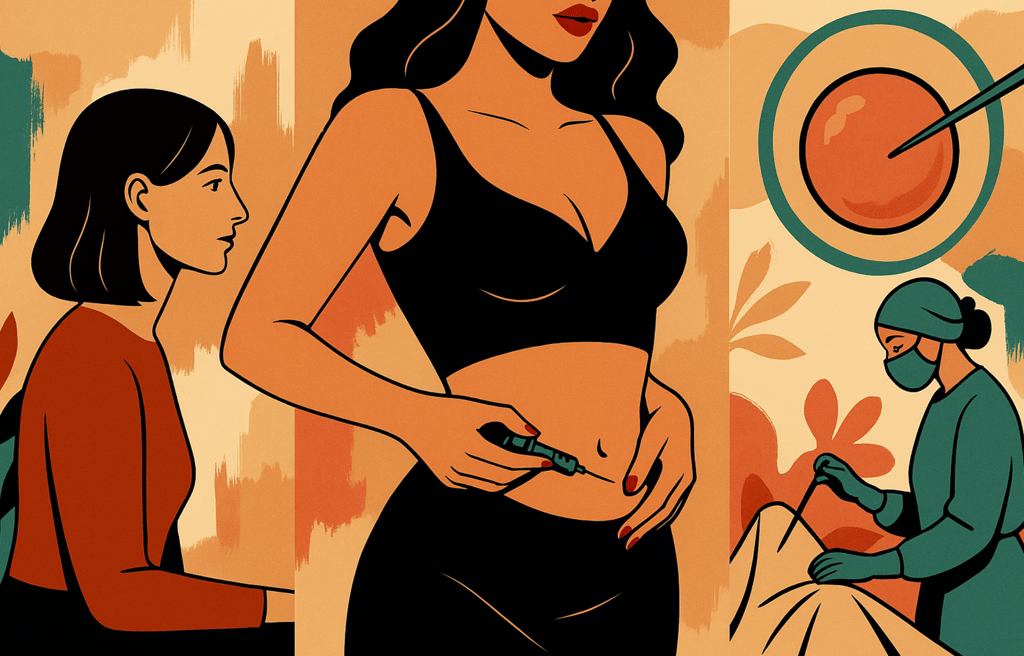IVF Timeline: From Start to Finish
A full breakdown of the IVF journey from initial consultation to embryo transfer, including wait times and what happens at each stage.
THE IVF PROCESS STEP BY STEP
7/15/2025


Embarking on IVF is a big decision — and one that often comes with more questions than answers. How long does IVF actually take? What happens at each step? And when will you know if it’s worked?
This post offers a realistic, UK-based timeline of the IVF process, covering both NHS and private care pathways. Whether you're at the very beginning or already waiting for your embryo transfer, this guide breaks it all down stage by stage.
Stage 1: GP Referral & Initial Consultation
Estimated time: 1–4 months (depending on NHS or private)
Your journey usually starts with a GP referral — particularly if you're pursuing NHS treatment. Your GP will assess your situation, run initial tests (like blood work and semen analysis), and refer you to a fertility clinic.
For private patients, you can self-refer directly to a clinic, often with a shorter wait time.
👉 Tip: Make sure both partners attend the first appointment if possible.
Stage 2: Fertility Testing
Estimated time: 2–6 weeks
Once referred, you’ll undergo further diagnostic tests. These might include:
Hormone blood tests (AMH, FSH, LH, prolactin, thyroid)
Ultrasound scan to check antral follicle count
Semen analysis
HyCoSy or HSG to check fallopian tubes
Pelvic exam or transvaginal scan
These tests help shape your treatment plan and determine if IVF is the right next step.
Stage 3: Eligibility & Treatment Planning
Estimated time: 1–8 weeks
NHS patients will find out if they meet local criteria for funded IVF. This varies widely across Clinical Commissioning Groups (CCGs) — based on age, BMI, relationship status, previous children, etc.
If eligible, you’ll move into planning. If not, your GP may help you explore private options.
Private clinics typically move faster at this stage and will offer a treatment plan after results are reviewed.
Stage 4: Starting IVF – The Medication Phase
Estimated time: 2–6 weeks
Once you’re cleared to start IVF, you’ll enter the stimulation cycle. This includes:
Downregulation (sometimes) – temporary hormone suppression
Stimulation – daily hormone injections to mature multiple eggs
Monitoring – 2–4 internal scans to track follicle growth
Trigger injection – 36 hours before egg collection
This stage can feel intense, both physically and emotionally. You’ll need to be available for clinic visits, sometimes with very short notice.
Stage 5: Egg Collection
Estimated time: 1 day + recovery
Egg retrieval is a short procedure under sedation or light anaesthetic. It usually takes around 20–30 minutes, followed by a few hours of rest.
You may feel bloated or crampy afterward. Most people take 1–2 days off work.
Stage 6: Fertilisation & Embryo Development
Estimated time: 3–6 days
On the same day as egg collection, sperm is added to the eggs. Over the next few days, the embryology team monitors development.
Day 1: Fertilisation check
Day 3: Cleavage stage (often when fresh transfers are done)
Day 5: Blastocyst stage (most clinics transfer or freeze here)
You’ll be updated along the way, but these days can be filled with uncertainty and hope.
Stage 7: Embryo Transfer
Estimated time: 1 day
If you're doing a fresh transfer, this usually happens on Day 3 or Day 5.
If you’re doing a frozen transfer, it may be delayed by several weeks for preparation.
Embryo transfer is a quick and usually painless procedure — a bit like a smear test.
Stage 8: The Two-Week Wait
Estimated time: 9–14 days
After transfer, you’ll begin taking progesterone and enter the dreaded "two-week wait." It's a time full of mixed emotions — hope, anxiety, impatience.
Blood tests (or a home pregnancy test) are usually done around 9–14 days after transfer to confirm if the embryo has implanted.
Things That Might Delay Your IVF Timeline
Waiting lists (especially on the NHS)
Needing further tests (e.g. genetic screening, hysteroscopy)
Protocol changes (e.g. switching to frozen transfer)
OHSS risk, or cycle cancellation
Embryos needing to be frozen and stored
It’s rarely a straight line — and many people need more than one round.
IVF can feel like a whirlwind of logistics, needles, and emotions — but knowing what’s coming can ease the stress. While no two timelines are exactly alike, understanding the typical process helps you prepare and advocate for yourself.
Whether you’re just starting out or counting down to your embryo transfer, remember: every step forward is a step closer to possibility.
© 2025. All rights reserved.
